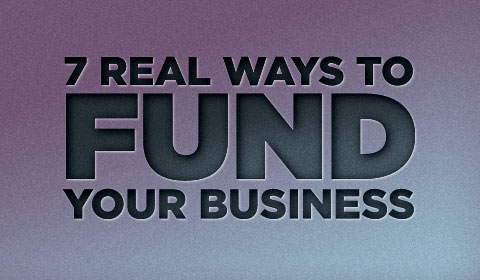Aspiring entrepreneurs are constantly faced with the challenge of how to fund their business ideas. When they inquire about ways to get money to launch their businesses, these same entrepreneurs are told to seek loans, grants, and investors.
Since those resources are not easily available, most entrepreneurs are forced to find their own way to kick start their companies.
We know it’s not easy to find money for your business, but you can expand your options by studying the success of other startups.
The BrandMakerNews Team asked seven entrepreneurs how they managed to fund their businesses. Read their stories below, and find the launch strategy that works best for you.
Here Are 7 Real Ways To Fund Your Business:
1. Seed Money From Family & Friends
“I started a publishing company called World Ahead Media. I raised several hundred thousand dollars in seed capital from friends and family, but as the business started to grow, cash quickly became tight because accounts receivable in the publishing industry age for a long time. I needed to raise additional working capital, but the task was made a lot harder because my investors didn’t understand the reasons for the cash crunch. I had been so focused on finding revenue channels that I hadn’t given them the transparency they needed to anticipate that more capital would be necessary for funding the business. In the end I ended up raising several hundred thousand dollars more and growing the business to profitability.” –Eric Jackson, founder of World Ahead Media and CEO/Co-founder of CapLinked
2. Business Plan Competition
“Several factors have emerged that promote lean startups, including cloud computing, shared office networks, social media marketing and alternative forms of financing through crowdfunding websites that aggregate small investments. My company (Bennu) tapped all these resources to launch without the need for external investment. We raised approximately $50,000 from business plan competition prize money (another alternative financing source) and founders contributions. While $50K limited our operating scope, it was sufficient to launch, learn and prove our concept. Our belief is that the more you can accomplish on your own at the seed stage, the better positioned you will be to raise growth capital once the company is ready to scale.” –Ashok Kamal, Co-Founder of Bennu, LLC
3. Personal Savings
“I am the President of the full-service public relations and integrated marketing firm, Marquet Media, LLC. When I started my business in 2007, my approximate start up costs were very low (compared to other businesses). I spent approximately $10,000 on incorporation and legal, marketing, and operating costs. I funded the company with my own savings (no outside investors were needed because the start up costs were small). My initial projected costs were accurate, so I was right on track. Overall, I am happy that I did not take private investors or finance my company with credit cards or credit line, because all of the revenue that we generate pays any overhead expenses, salaries, etc. In fact, we are a debt-free company, which makes my job of managing my workers and my staff very easy.” –Kristin Marquet, President of Marquet Media LLC
4. Pay As You Grow
“I spent under a grand to launch my consultancy (Epic Measures). Since I was bent on not borrowing to launch and wanted to weigh product viability, I implemented a pay-as-you-grow (PAYG) plan. PAYG entailed using funds garnered from existing clients (whom I gained through word-of-mouth), to pay for aspects of the business as the business grew or as needed. I am 100% pleased with the PAYG plan because it ensured that I did not waste time or money launching a business or a concept that was not sustainable. It also ensured that I owned the company outright.” –Isha Edwards, Brand Marketing Consultant, Epic Measures LLC
5. Shoestring Budget
“I am the owner of Xomba.com, a writing community that shares its ad revenue with people who post articles and bookmarks on our site. I started the company in 2006 at 26 years old with a measly $10,000. Over the last four years we have grown to a six employee company and given our users over $1 million dollars. We became profitable within the first year of operation and never took another cent of funding since. I think it is very important for entrepreneurs to understand that is possible to launch a successful business on a shoestring budget.” –Nick Veneris, Owner of Xomba.com
6. Bootstrapping
“We started our business (RabbitHole Consulting) for about as little as humanly possible by using many free resources available these days through the web. Start-up Costs: LLC Registration, approximately $90. Website approximately $100 ($10/year domain registration; $50/year hosting registration; $40 for a WordPress theme that is easy enough for anyone with pretty basic web skills to launch). We have started out by working from home and setting meetings at local coffee shops or the library of our local University, which was free. We use Google Docs and Gmail to run all of our administrative aspects. We use social media for the bulk of our marketing which is free for the most part. We will occasionally run Google AdWords and Facebook Ads Campaigns but those generally never run over a budget of $50 for a week. That’s basically all it’s taken us to get our business running. –Patrick Reagin, Co-Founder of RabbitHole Consulting
7. Self-Funded
Entrepreneur, Chris Raniere, founded Beautisol, a sun care company two years ago. The company, completely self funded, cost less than $300,000 to launch. Thanks to the recession, Chris was able to use equipment (computers, monitors, software) from previous companies therefore saving close to $50,000. For a year and a half the company was run out of Chris home, with close to 25 friends helping out and running the business.
Chris not only saved money on rent, but on employee salaries since all of his friends volunteered their time. The majority of the costs went to product development, packaging and manufacturers. Two years later, Beautisol is now a successful company with an actual office and a very bright future.
By definition, an entrepreneur is a person who organizes and operates a business, taking on greater than normal financial risks in order to do so. You are inevitably going to need money, and then even more money to fund your business.
Explore all of the funding options available to you, and learn from the experiences of other entrepreneurs who found a way to pay for their great ideas. Good luck with your business!
Need more funding ideas? Read 7 Ways To Fund Your Start-Up.
And, if you know of any other resources to help entrepreneurs fund their businesses, please share them below…


